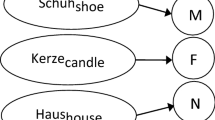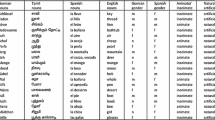Abstract
The study aimed at investigating the role of nominal gender in animal categorization in preschoolers. Given the regularities characterizing gender system, at both syntactical and morphological level, Italian language is suitable to address this issue. In three experiments, participants were asked to classify pictures of animals as male or female. Half stimuli had names of feminine gender and half of masculine gender. In Experiment 1, Italian speaking adults and preschoolers classified animals according to the nominal gender. This effect was not found with English speaking participants (Experiment 2) but confirmed with 3-, 4-, and 5-year-old Italian-speaking children (Experiment 3). These results showed an implicit knowledge of grammatical gender in preschoolers, suggesting that semantic processing may be modulated by linguistic information.
Similar content being viewed by others
References
Agnoli, F., & Forer, D. (2005). Can objects be male or female? The influence of Italian and German grammatical gender in classification. Paper presented at the symposium relation between language and cognition, SRCD, Atlanta, 10 April.
Akhutina T., Kurgansky A., Polinsky M., Bates E. (1999) Processing of grammatical gender in a three-gender systems: Experimantal evidence from Russian. Journal of Psycholinguistic Research 28: 695–713
Andonova E., D’Amico S., Devescovi A., Bates E. (2004) Gender and lexical access in Bulgarian. Perception and Psychophysics 66: 496–507
Aronoff M. (1994) Morphology by itself, stems and inflectional classes. MIT Press, Cambridge MA
Bates E., Devescovi A., Hernandez A., Pizzamiglio L. (1996) Gender priming in Italian. Perception and Psychophysics 58: 992–1004
Bates E., Devescovi A., Pizzamiglio L., D’Amico S., Hernandez A. (1995) Gender and lexical access in Italian. Perception and Psychophysics 57: 847–862
Bentrovato S, Devescovi A, D’Amico S, Bates E. (1999) Effect of grammatical gender and semantic context on lexical access in Italian. Journal of Psycholinguistic Research 28: 677–693
Berent I., Pinker S., Shimron J. (1999) Default nominal inflection in Hebrew: Evidence for mental variables. Cognition 72: 1–44
Boloh I., Ibernon L. (2010) Gender attribution and gender agreement in 4- to 10-year-old French children. Cognitive Development 25: 1–25
Boroditsky L., Schmidt L. A., Phillips W. (2003) Sex, syntax and semantics. In: Gentner D., Goldin Meadow S. (eds) Language in mind. MIT Press, Cambridge
Clarke M. A., Losoff A., McCracken M. D., Rood D. S. (1984) Linguistic relativity and sex/gender studies: Epistemological and methodological considerations. Language Learning 34: 47–67
Clarke M. A., Losoff A., McCracken M. D., Still J. (1981) Gender perception in Arabic and English. Language Learning 31: 159–169
Colè P., Segui J. (1994) Grammatical incongruency and vocabulary types. Memory and Cognition 22: 387–394
Corbett G. (1991) Gender. Cambridge University Press, Cambridge, UK
Cubelli R., Paolieri D., Lotto L., Job R. (2011) The effect of grammatical gender on object categorization. Journal of Experimental Psychology: Learning, Memory, and Cognition, 37: 449–460
Desrochers A., Brabant M. (1995) Interaction entre facteurs phonologiques et sémantiques dans une épreuve de catégorisation lexicale. Revue Canadienne de Psychologie Expérimentale 49: 240–262
Desrochers A., Paivio A. (1990) Le phonème initial des noms inanimés et son effet sur l’identification du genre grammatical. Revue Canadienne de Psychologie 44: 44–57
Desrochers A., Paivio A., Desrochers S. (1989) L’effet de la fréquence d’usage des noms inanimés et de la valeur prédictive de leur terminaison sur l’identification du genre. Revue Canadienne de Psychologie 43: 62–73
Dominguez A., Cuetos F., Segui J. (1999) The processing of grammatical gender and number in Spanish. Journal of Psycholinguistic Research 28: 485–513
Ervin S. M. (1962) The connotations of gender. Word 18: 249–261
Fagot B. I., Leinbach M. D., Hagan R. (1986) Gender labeling and the adoption of sex-typed behaviors. Developmental Psychology 22: 440–443
Flarty M. (2001) How a language gender system creeps into perception. Journal of Cross-cultural Psychology 32: 18–31
Friederici A., Jacobsen T. (1999) Processing grammatical gender during language comprehension. Journal of Psycholinguistic Research 28: 467–484
Faussart C., Jakubowicz C., Costes M. (1999) Gender and number processing in spoken French and Spanish. Rivista di Linguistica 11: 75–101
Gentner, D., Goldin-Meadow, S. (eds) (2003) Language in mind. MIT Press, Cambridge, MA
Greenberg, J. H. (1990). How does language acquire gender markers? In K. Denning & S. Kemmer (Eds.), On language: Selected writings of Joseph H. Greenberg (pp. 227–240). Stanford: Stanford University Press.
Grosjean F., Dommergues J. Y., Cornu E., Guillemon D., Besson C. (1994) The gender marking effect in spoken noun recognition. Perception and Psychophysics 56: 590–598
Guiora A. Z., Beit-Hallahmi B., Fried R., Yoder C. (1982) Language-environment and gender identity attainment. Language Learning 32: 289–304
Hernandez-Pina F. (1984) Teorias pscicolinguìsticas y su applicatión a la acquisición del espaňol como lengua materna. Siglo XXI, Madrid
Holmes V. M., Dejean de la Batie B. (1999) Assignment of grammatical gender by native speakers and foreign learners of French. Applied Psycholinguistics 20: 479–506
Holmes V. M., Segui J. (2004) Sub-lexical and lexical influences on gender assignment in French. Journal of Psycholinguistic Research 33: 425–457
Holmes V. M., Segui J. (2006) Assigning grammatical gender during word production. Journal of Psycholinguistic Research 35: 5–30
Hunt E. B., Agnoli F. (1991) The Whorfian hypothesis: A cognitive psychology perspective. Psychological Review 98: 377–389
Karmiloff-Smith A. (1979) A functional approach to child language: A study of determiners and reference. Cambridge University Press, Cambridge, UK
Konishi T. (1993) The semantics of grammatical gender: A cross-cultural study. Journal of Psycholinguistic Research 22: 519–534
Konishi T. (1994) The connotations of gender: A semantic differential study of German and Spanish. Word 45: 317–327
Martinez I. M., Shartz M. (1996) Linguistic influences on categorization in preschool children: A cross-linguistic study. Journal of Child Language 23: 529–545
Marx E. (1999) Gender processing in speech production: Evidence from German speech errors. Journal of Psycholinguistic Research 28: 601–621
Mills A. E. (1986) The acquisition of gender: A study of English and German. Springer, Berlin
Mirković J., MacDonald M. C., Seidenberg M. S. (2005) Where does gender come from? Evidence from a complex inflectional system. Language and Cognitive Processes 20: 139–168
Padovani R., Cacciari C. (2003) Il ruolo della trasparenza morfologica nel riconoscimento di parole in Italiano. Giornale Italiano di Psicologia 30: 749–771
Pérez-Pereira M. (1991) The acquisition of gender: What Spanish children tell us. Journal of Child Language 18: 571–590
Picallo M. C. (2008) Gender in Romance languages. Lingue e Linguaggio 7: 47–66
Roca I. (1989) The organization of grammatical gender. Transactions of the Philological Society 87: 1–32
Sapir E. (1921) Language. Harcourt, Brace, and World, New York
Seigneuric A., Zagar D., Meunier F., Spinelli E. (2007) The relation between language and cognition in 3- to 9-year-olds: The acquisition of grammatical gender in French. Journal of Experimental Child Psychology 96: 229–246
Sera M. D., Berge C., del Castillo Pintado J. (1994) Grammatical and conceptual forces in the attribution of gender by English and Spanish Speakers. Cognitive Development 9: 261–292
Sera M. D., Elieff C., Forbes J., Burch M. C., Rodriguez W., Dubois D. P. (2002) When language affects cognition and when it does not: An analysis of grammatical gender and classification. Journal of Experimental Psychology: General 131: 377–397
Slobin D. I. (1996) From “thought and language” to “thinking for speaking”. In: Gumperz J. J., Levinson S. C. (eds) Rethinking linguistic relativity. Cambridge University Press, Cambridge, MA
Taft M., Meunier F. (1998) Lexical representation of gender: A quasi-regular domain. Journal of Psycholinguistic Research 27: 23–45
Tawmoski-de Ryck L., Verluyten P. (1982) Linguistic control of pronouns. Journal of Semantics 1: 323–346
Tomasello M. (2000) Do young children have adult syntactic competence?. Cognition 74: 209–253
Tucker G. R., Lambert W. E., Rigault A. A., Segalowitz N. (1968) A psychological investigation of French speaker’s skill with grammatical gender. Journal of Verbal Learning and Verbal Behaviour 7: 312–316
Wehren A., Lisi R. (1983) The development of gender understanding: Judgments and explanations. Child Development 54: 1568–1578
Whorf B. L. (1956) Language, thought and reality: Selected writings of Benjamin Lee Whorf. MIT Press, Cambridge, MA
Zubin D., Köpcke K.-M. (1986) Gender and folk taxonomy: The indexical relation between grammatical and lexical categorization. In: Craig C. G. (eds) Noun classes and categorization: Proceedings of a symposium on categorization and noun classification. Benjamins, Amsterdam
Author information
Authors and Affiliations
Corresponding author
Rights and permissions
About this article
Cite this article
Belacchi, C., Cubelli, R. Implicit Knowledge of Grammatical Gender in Preschool Children. J Psycholinguist Res 41, 295–310 (2012). https://doi.org/10.1007/s10936-011-9194-y
Published:
Issue Date:
DOI: https://doi.org/10.1007/s10936-011-9194-y




